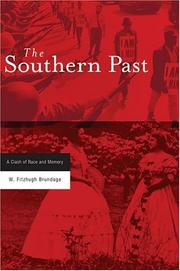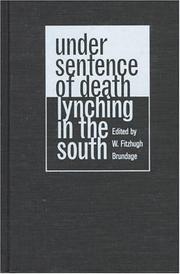| Listing 1 - 10 of 14 | << page >> |
Sort by
|

ISBN: 0674028988 9780674028982 0674027213 9780674027213 9780674018761 0674018761 9780674027213 0674018761 Year: 2009 Publisher: Cambridge, MA
Abstract | Keywords | Export | Availability | Bookmark
 Loading...
Loading...Choose an application
- Reference Manager
- EndNote
- RefWorks (Direct export to RefWorks)
Since the Civil War whites and blacks have struggled over the meanings and uses of the Southern past. Indeed, today's controversies over flying the Confederate flag, renaming schools and streets, and commemorating the Civil War and the civil rights movement are only the latest examples of this ongoing divisive contest over issues of regional identity and heritage. The Southern Past argues that these battles are ultimately about who has the power to determine what we remember of the past, and whether that remembrance will honor all Southerners or only select groups. For more than a century after the Civil War, elite white Southerners systematically refined a version of the past that sanctioned their racial privilege and power. In the process, they filled public spaces with museums and monuments that made their version of the past sacrosanct. Yet, even as segregation and racial discrimination worsened, blacks contested the white version of Southern history and demanded inclusion. Streets became sites for elaborate commemorations of emancipation and schools became centers for the study of black history. This counter-memory surged forth, and became a potent inspiration for the civil rights movement and the black struggle to share a common Southern past rather than a divided one. W. Fitzhugh Brundage's searing exploration of how those who have the political power to represent the past simultaneously shape the present and determine the future is a valuable lesson as we confront our national past to meet the challenge of current realities.
Memory --- Group identity --- Collective identity --- Community identity --- Cultural identity --- Social identity --- Identity (Psychology) --- Social psychology --- Collective memory --- Retention (Psychology) --- Intellect --- Psychology --- Thought and thinking --- Comprehension --- Executive functions (Neuropsychology) --- Mnemonics --- Perseveration (Psychology) --- Reproduction (Psychology) --- Social aspects --- Southern States --- Civilization. --- History. --- Race relations.
Book
ISBN: 1469602962 0807878022 9780807878026 9781469602967 9780807834626 0807834629 9780807871843 0807871842 9798890840004 9798893130003 Year: 2011 Publisher: Chapel Hill : University of North Carolina Press,
Abstract | Keywords | Export | Availability | Bookmark
 Loading...
Loading...Choose an application
- Reference Manager
- EndNote
- RefWorks (Direct export to RefWorks)
This collection of thirteen essays, edited by historian W. Fitzhugh Brundage, brings together original work from sixteen distinguished scholars in various disciplines, ranging from theater and literature to history and music, to address the complex roles of black performers, entrepreneurs, and consumers in American mass culture during the early twentieth century. Moving beyond the familiar territory of blackface and minstrelsy, these essays present a fresh look at the history of African Americans and mass culture. With subjects ranging from representations of race in sheet music illus
African Americans --- Mass media --- African Americans in popular culture. --- African Americans in mass media. --- Afro-Americans --- Black Americans --- Colored people (United States) --- Negroes --- Africans --- Ethnology --- Blacks --- Afro-Americans in popular culture --- Popular culture --- Afro-Americans in mass media --- Race identity --- History. --- African Americans in mass media --- Noirs américains dans les médias --- Noirs américains dans la culture populaire --- Médias --- Noirs américains --- History --- Histoire --- Identité ethnique --- United States --- Etats-Unis --- Ethnic relations --- Relations interethniques --- Black people

ISBN: 0807866555 9780807866559 0807823260 0807846368 9780807823262 9780807846360 9798890868329 Year: 1997 Publisher: Chapel Hill : University of North Carolina Press,
Abstract | Keywords | Export | Availability | Bookmark
 Loading...
Loading...Choose an application
- Reference Manager
- EndNote
- RefWorks (Direct export to RefWorks)
This collection of essays explores "such topics as same-race lynchings, black resistance to white violence, and the political motivations for lynching ... The book raises important questions about Southern history, race relations, and the nature of American violence."--Back cover.
Lynching --- African Americans --- Racism --- Criminology, Penology & Juvenile Delinquency --- Social Welfare & Social Work --- Social Sciences --- Afro-Americans --- Black Americans --- Colored people (United States) --- Negroes --- Africans --- Ethnology --- Blacks --- Homicide --- Bias, Racial --- Race bias --- Race prejudice --- Racial bias --- Prejudices --- Anti-racism --- Critical race theory --- Race relations --- History. --- Crimes against --- History --- Southern States --- Black people --- Anti-lynching movements --- Social sciences --- Criminology --- Criminology.
Book
ISBN: 0674988663 067498868X Year: 2018 Publisher: Cambridge, MA : Harvard University Press,
Abstract | Keywords | Export | Availability | Bookmark
 Loading...
Loading...Choose an application
- Reference Manager
- EndNote
- RefWorks (Direct export to RefWorks)
Over the centuries Americans have turned to torture during moments of crisis, and have debated its legitimacy and efficacy in defense of law and order. Tracing these historical attempts to adapt torture to democratic values, Fitzhugh Brundage reveals the recurring struggle over what limits Americans are willing to impose on the power of the state.
Torture --- Torture --- Justification (Ethics) --- History. --- Moral and ethical aspects --- Abu Ghraib. --- Andersonville. --- Anti-Imperialists. --- Bush. --- CIA. --- Geneva Conventions. --- George Brandle. --- Guantanamo Bay. --- Jon Burge. --- Korean War. --- McKinley. --- My Lai. --- POWs. --- Philippines War. --- Reagan. --- Third Degree. --- Vietnam War. --- enhanced interrogation. --- exceptionalism.
Book
ISBN: 9780674988682 067498868X 9780674988668 0674988663 9780674737662 0674737660 Year: 2018 Publisher: Cambridge, MA : Harvard University Press,
Abstract | Keywords | Export | Availability | Bookmark
 Loading...
Loading...Choose an application
- Reference Manager
- EndNote
- RefWorks (Direct export to RefWorks)
Over the centuries Americans have turned to torture during moments of crisis, and have debated its legitimacy and efficacy in defense of law and order. Tracing these historical attempts to adapt torture to democratic values, Fitzhugh Brundage reveals the recurring struggle over what limits Americans are willing to impose on the power of the state.
Torture --- Justification (Ethics) --- History. --- Moral and ethical aspects --- Abu Ghraib. --- Andersonville. --- Anti-Imperialists. --- Bush. --- CIA. --- Geneva Conventions. --- George Brandle. --- Guantanamo Bay. --- Jon Burge. --- Korean War. --- McKinley. --- My Lai. --- POWs. --- Philippines War. --- Reagan. --- Third Degree. --- Vietnam War. --- enhanced interrogation. --- exceptionalism.
Digital
ISBN: 9780674028982 Year: 2009 Publisher: Cambridge, Mass. Harvard University Press
Abstract | Keywords | Export | Availability | Bookmark
 Loading...
Loading...Choose an application
- Reference Manager
- EndNote
- RefWorks (Direct export to RefWorks)
Digital
ISBN: 9780674988682 Year: 2018 Publisher: Cambridge, Mass. Harvard University Press
Abstract | Keywords | Export | Availability | Bookmark
 Loading...
Loading...Choose an application
- Reference Manager
- EndNote
- RefWorks (Direct export to RefWorks)
Book
ISBN: 0779980204 9780779980208 Year: 2015 Publisher: Lewiston
Abstract | Keywords | Export | Availability | Bookmark
 Loading...
Loading...Choose an application
- Reference Manager
- EndNote
- RefWorks (Direct export to RefWorks)
Book
ISBN: 1280772298 9786613683069 1603446613 9781603446617 9781603445825 160344582X 9781280772290 661368306X Year: 2012 Publisher: College Station : Published for the University of Texas at Arlington by Texas A&M University Press,
Abstract | Keywords | Export | Availability | Bookmark
 Loading...
Loading...Choose an application
- Reference Manager
- EndNote
- RefWorks (Direct export to RefWorks)
Although the origins, application, and socio-historical implications of the Jim Crow system have been studied and debated for at least the last three-quarters of a century, nuanced understanding of this complex cultural construct is still evolving, according to Stephanie Cole and Natalie J. Ring, coeditors of The Folly of Jim Crow: Rethinking the Segregated South. Indeed, they suggest, scholars may profit from a careful examination of previous assumptions and conclusions along the lines suggested by the studies in this important new collection. Based on the March 20
African American women --- African Americans --- Afro-Americans --- Black Americans --- Colored people (United States) --- Negroes --- Africans --- Ethnology --- Blacks --- Afro-American women --- Women, African American --- Women, Negro --- Women --- Social conditions --- Segregation --- Southern States --- Race relations --- History --- Black people
Book

ISBN: 9780691216249 Year: 2020 Publisher: Princeton, NJ
Abstract | Keywords | Export | Availability | Bookmark
 Loading...
Loading...Choose an application
- Reference Manager
- EndNote
- RefWorks (Direct export to RefWorks)
| Listing 1 - 10 of 14 | << page >> |
Sort by
|

 Search
Search Feedback
Feedback About UniCat
About UniCat  Help
Help News
News